Greenprint: Our Guide to Environmental Healing


A journey toward lessening our environmental impact
The Detroit Zoological Society has developed a unique, green roadmap called the Greenprint. This evolving plan guides our operations and is the plan by which we refine and improve our facilities and daily practices, develop new policies and programs and improve green literacy and action in our community.
Learn More (PDF)
-
GreenPrize Award Program
Now accepting submissions for 2024!
Overview:
Be an eco-champion and make the world a greener place with GreenPrize!
The Detroit Zoological Society invites student groups in Macomb, Oakland and Wayne counties to participate in the 2024-2025 GreenPrize award program. This program encourages students to organize “EcoClubs” or “Green Teams” and lead a project in their school or community that benefits the environment and creates a connection between the community and the natural world.
Stage 1 of the program is open to all interested EcoClubs and Green Teams in the tri-county area. Groups are asked to plan a project that positively impacts the environment and engages the community. Student groups are encouraged to use this opportunity to help their school receive Michigan Green School certification. Projects will be evaluated based on meeting program requirements (see scoring rubric) and the quality of the proposal, which is determined by a jury vote. Student groups may choose to advance one or more of the Green Activities suggested by the Michigan Green Schools program, or propose their own creative projects. Successful teams will receive a monetary award and be invited to participate in Stage 2 of the program — implementing the proposed project.
Stage 2 of the program invites teams to submit proof of implementation. Successful implementation earns each team and adviser a ticket to GreenFest at the Detroit Zoo. Teams that successfully implement their projects will be recognized during the event’s awards ceremony.
GreenPrize is open to fifth- through 12th-grade student teams in Macomb, Oakland and Wayne counties. Each team must have a staff or faculty adviser to serve as a contact for the project. The adviser will be the go-to for the students and hold them accountable as the project moves through its phases.
PURPOSE
The GreenPrize Award Program encourages young people to consider how their actions impact the environment and gives students the resources they need to protect the planet. By supporting the next generation, we can work together to create a greener future for all.
HERE’S HOW IT WORKS:
Step 1: LEARN MORE | ATTEND OUR TALKING SESSION AT 3 P.M. OCT. 3, 2024
- Optional question and answer session will be offered at 3 p.m. Friday, Oct. 6. To receive an invitation with webinar link, please submit your interest to sustainability@dzs.org.
GreenPrize Listening Session
Step 2: SUBMIT YOUR PROPOSAL | DEADLINE: 11 A.M. NOV. 11, 2024
- Final proposals must be submitted by Nov. 17, 2023. View full program guidelines here.
Step 3: WINNERS ANNOUNCED | STAY TUNED TO YOUR INBOX DEC. 6, 2024
- All award winners will be announced via email on Dec. 6, 2024.
Step 4: HAVE FUN & GET IT DONE | 4 P.M. APR. 4, 2025
- Take your winnings to the next level! All award winners can win a second prize: a day at the Zoo! Each winning Green Team that successfully uses their winnings to execute their proposal will be invited to an award ceremony during GreenFest at the Detroit Zoo.
-
Community Engagement + Outreach
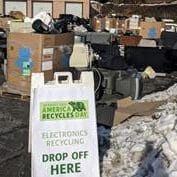
Electronic Recycling Events
Recycling electronic waste (eWaste) helps to reduce disturbances to habitats threatened by mining or other intrusive removal practices and supports diverting the needless disposal of precious metals from landfills. EWaste generated by DZS is recycled throughout the year. You can too! Here are some opportunities to get you started:
- Gorillas on the Line Campaign (February 1 – April 30)
- DZS Electronics Recycling Collection Event
- County Resources
- Community Resources
- Direct to the Electronic Manufacturer (year-round)
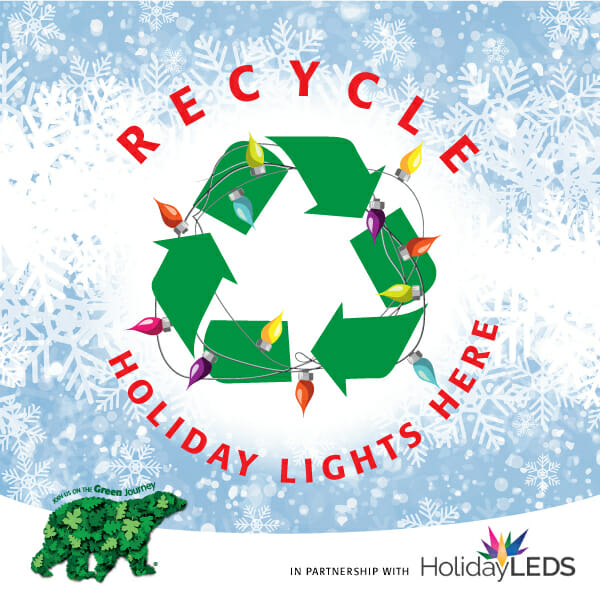
Holiday Light Recycling
The Detroit Zoological Society (DZS) offers free holiday light recycling during Wild Lights. Guests are encouraged to bring in broken holiday lights and the DZS will properly recycle them. Collection occurs December 1st through the month of January. Drop off lights inside the Main Gates at the Guest Services office.

GreenFest
In observance of the global holiday celebrating our planet, Earth Day, the DZS hosts our annual GreenFest celebration at the Detroit Zoo. GreenFest provides education on sustainability and what people can do at home to join us on our Green Journey.
-
Industry Leadership

Greenprint
The Detroit Zoological Society has developed a unique, green roadmap called the Greenprint. This comprehensive strategic plan guides our operations and is the plan by which we refine and improve our facilities and daily practices, develop new policies and programs and improve green literacy in our community. Follow our Greenprint Pinterest Board for green tips and ideas.
The Detroit Zoological Society has developed a unique, green roadmap called the Greenprint. This comprehensive strategic plan guides our operations and is the plan by which we refine and improve our facilities and daily practices, develop new policies and programs and improve green literacy in our community. Follow our Greenprint Pinterest Board for green tips and ideas.
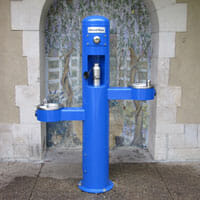
Water Bottle Phase-Out Program
We have successfully weaned Detroit Zoo visitors off the bottle! In August 2013, the Detroit Zoological Society launched a three-year initiative to discontinue the sale of bottled water as part of our green journey. Inexpensive reusable bottles are sold at concession stands, which can be refilled for free at one of 21 filtered-water stations throughout the grounds.
We have successfully weaned Detroit Zoo visitors off the bottle! In August 2013, the Detroit Zoological Society launched a three-year initiative to discontinue the sale of bottled water as part of our green journey. Inexpensive reusable bottles are sold at concession stands, which can be refilled for free at one of 21 filtered-water stations throughout the grounds.
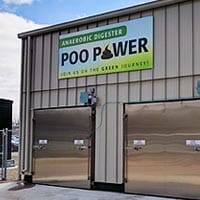
Anaerobic Digester
We have built an anaerobic digester, which diverts over 500 tons of animal manure, bedding and food waste from the landfill and converts it into compost. We use this compost material on our gardens throughout Detroit Zoo’s 125-acre facility. The methane byproduct can be used as an alternative energy source for the Ruth Roby Glancy Animal Health Complex.
We have built an anaerobic digester, which diverts over 500 tons of animal manure, bedding and food waste from the landfill and converts it into compost. We use this compost material on our gardens throughout Detroit Zoo’s 125-acre facility. The methane byproduct can be used as an alternative energy source for the Ruth Roby Glancy Animal Health Complex.
Green Certified Restaurant
Both Buddy’s Pizza and Table 28 have been verified by the Green Restaurant Association as 3 Star Certified Green Restaurants. This prestigious award reflects a dedication and commitment to sustainable practices by the Detroit Zoological Society and its food and retail provider, SSA Group.
Both Buddy’s Pizza and Table 28 have been verified by the Green Restaurant Association as 3 Star Certified Green Restaurants. This prestigious award reflects a dedication and commitment to sustainable practices by the Detroit Zoological Society and its food and retail provider, SSA Group.
-
Energy Management
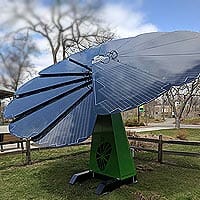
Solar Energy
The smartflower, an all-in-one ground-mounted solar-panel system, is blooming in the garden just east of the wildlife Carousel at the Detroit Zoo and is estimated to generate more than 4,000 kilowatts of electricity annually. Based on the concept of how a sunflower follows the sun, the 16-by-16-foot system features 12 solar “petals” that trail the sun across the sky throughout the day via a GPS-based dual-axis tracker.
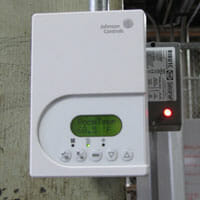
Energy Efficiency Upgrades
In 2012, we completed a $2 million energy efficiency project for upgrades including lighting, mechanical, controls and water conservation. This project promises to save the Zoo nearly $275,000 in annual utility costs with a payback of 6.5 years and a savings of more than 1,500 tons of carbon dioxide. The energy efficiency upgrades span more than 50 Detroit Zoo buildings and include installation of additional utility meters and low-flow toilets as well as rooftop unit upgrades and boiler control upgrades. We continue to find ways to make our operations more efficient and lessen our use of fossil fuels.

Lighting Upgrades
As part of our energy efficiency improvement project, the Zoo continues to install lighting upgrades throughout our grounds. LED lights in the Great Apes of Harambee indoor habitat simulate sunrise and sunset to improve animal comfort, and LED lights are also used at the parking structure, Picnic Grove Restrooms and Events Pavilion. In addition, more than five million LED lights illuminate the Zoo for our Wild Lights event.
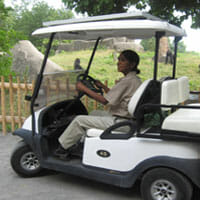
Solar Powered Carts
During our peak season, 38 solar/electric vehicles are used by staff to carry equipment, tools and the occasional guest throughout the Zoo. The panels on top of these vehicles collect solar energy and provide supplemental power. However, we have reduced golf cart usage by 25% using bicycles and walking; more than 60 bicycles are in use by our staff.
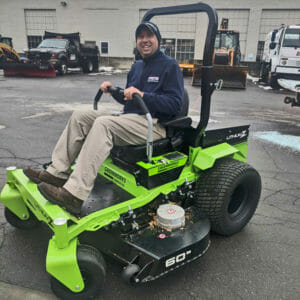
Electric Powered Lawn Equipment
The conversion to electric mowers, leaf blowers and hedge trimmers at the Zoo is both an environmental and an animal-friendly choice since the equipment does not emit exhaust or other pollutants. This helps us to further reduce our carbon footprint.
-
Stormwater Management
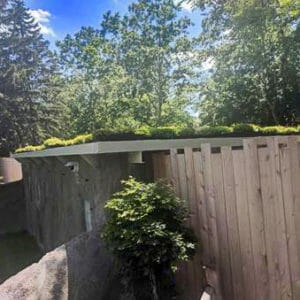
Green Roofs
The Detroit Zoo has incorporated innovative sustainable infrastructure in the form of green roofs. A green roof provides a rainwater buffer, purifies the air, reduces the ambient temperature, regulates the indoor temperature, saves energy and encourages biodiversity by providing habitat for wildlife.
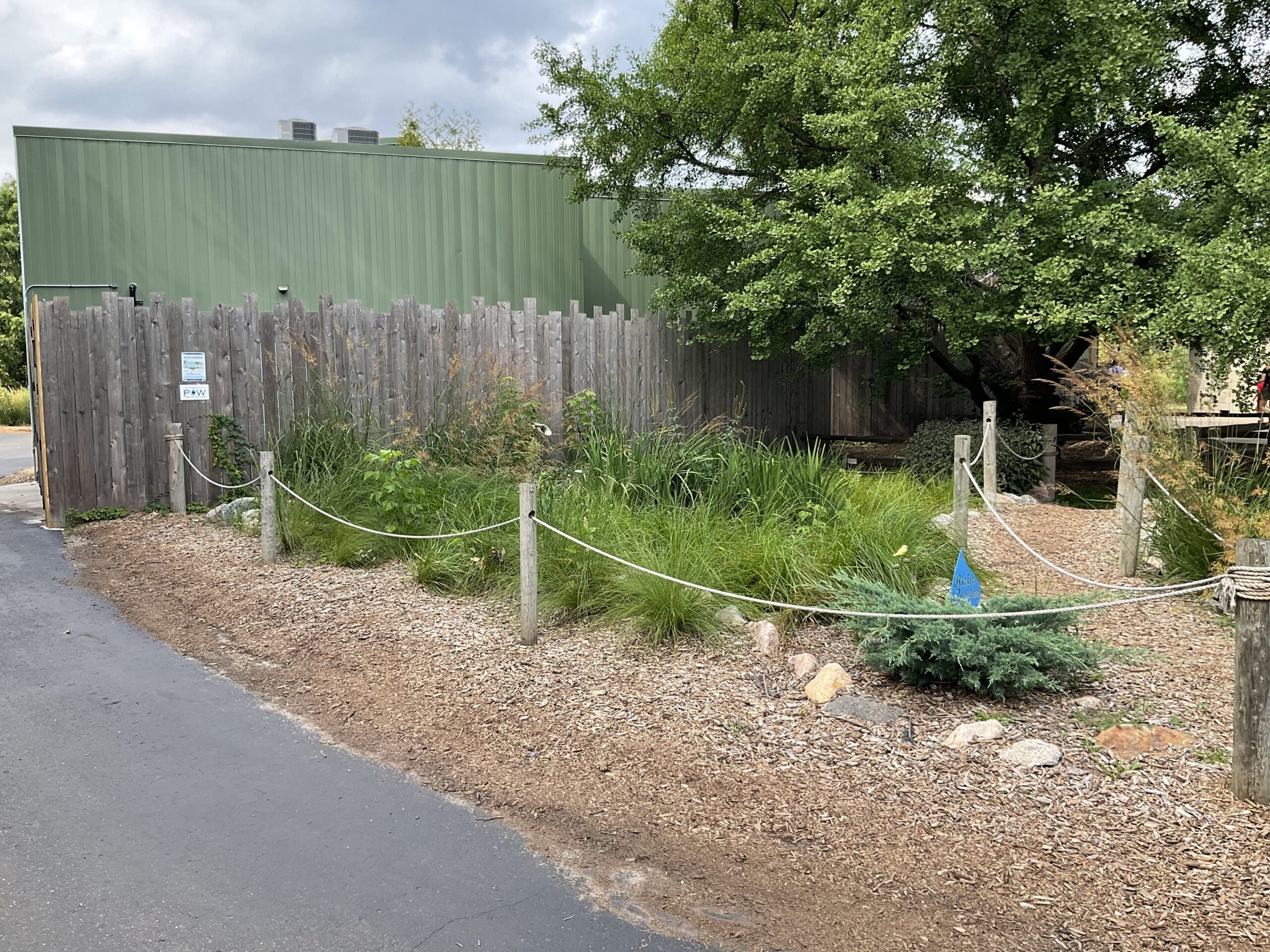
Rain Garden
This rain garden is located at the Ford Education Center and behind Buddy’s Pizza. The vegetation absorbs the rainwater from an underground pipe that transports the water to these plants. A rain garden helps keep clean, fresh rainwater out of the sewer system and reduces pollution.
-
Waste & Materials Management

2022 Recycling Infrastructure Grant
$705,029 was awarded to DZS from EGLE as part of a $881,286 project to advance the DZS goals to improve diversion from the landfill and reduce contamination of recycling. The project has 3 Focus Areas: 1- Planning/design/construction of a building to manage back-of-house recycling, 2- Equipment and vehicles, and 3- Pilot programs to evaluate containers at the point-of-disposal.

Water Bottle Phase-Out Program
During your next trip to the Zoo, bring your own bottle or purchase an inexpensive one from any of our concession stands and fill up at one of our 21 free filtered-water stations. We are keeping 60,000 plastic bottles out of the waste stream annually by no longer selling plastic single-use water bottles.
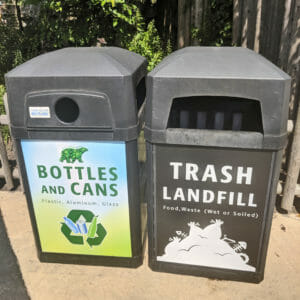
Trash and Recycling Containers
We have acquired and placed more than 140 recycling and trash containers throughout the Zoo. The circular openings on the recycling container allow for better sorting of recyclable materials. Waste and recycling containers are also paired, so that guests will always have the option to recycle, rather than put their items in a landfill.
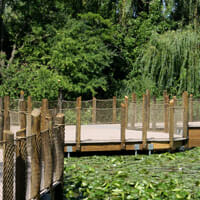
Boardwalk Recycled Materials
The boardwalk at the Cotton Family Wetlands is constructed with a material made of 50% plastic bags, 45% recycled hardwood and 5% polymers. Products like these keep materials out of landfills and turn them into a valuable building material.

Electronic Waste Recycling
Recycling electronic waste (eWaste) helps to reduce disturbances to habitats threatened by mining or other intrusive removal practices and supports diverting the needless disposal of precious metals from landfills. EWaste generated by DZS is recycled throughout the year. You can too! Here are some opportunities to get you started:
- Gorillas on the Line Campaign (February 1 – April 30)
- DZS America Recycles Day eWaste Collection (week of November 15)
- County Resources
- Community Resources
- Direct to the Electronic Manufacturer (year-round)

Zoo Map Recycling
This container is located at the exit of the Zoo so that guest may recycle their maps. The maps are refolded by volunteers and reused whenever possible. If they cannot be reused, they are recycled with the rest of our paper products.
-
Shades of Green
Shades of Green Guide (PDF)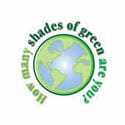 There are many shades of green and many ways each and every one of us can do something to help the environment. How many shades of green are you? Use this guide to help lighten your impact on the Earth and the animals that share it with us.
There are many shades of green and many ways each and every one of us can do something to help the environment. How many shades of green are you? Use this guide to help lighten your impact on the Earth and the animals that share it with us. -
What You Can Do
What You Can Do
- Use our Shades of Green Guide to lighten your impact on the environment – Download PDF
- Buy environmentally safe cleaning products
- Support organizations that buy land to conserve it
- Purchase carbon emission credits
- Choose domesticated animals for pets; exotic pets are often taken from the wild
- Adjust and/or monitor your thermostat
- Turn off lights when not needed
- Adjust the temperature of your refrigerator and freezer
- Turn the water heater down to 120 degrees F
- Place old towels under your doors to prevent drafts
- Obey speed limits to increase gas mileage
- Use natural lighting whenever possible
- Choose energy-efficient appliances
- Line dry your laundry
- Travel by train instead of plane
- Walk, ride your bike, or use public transportation to get around
- Buy local produce that is in season
- Drink filtered tap water when available
- Run your dishwasher only when full
- Take short showers
- Fix leaky faucets
- Opt for a low-flow showerhead
- Collect rainwater and use it to water your lawn and garden
- Plant a rain garden to manage storm water run-off from roofs and driveways
- Reuse bags and take reusable bags to the store
- Pack your lunch in a reusable container and use a cloth napkin
- Donate used items to charities and friends instead of throwing them away
- Use a refillable water bottle
- Recycle at home, school and work
- Use a refillable coffee filter
- Purchase recycled toilet paper, paper towels and facial tissue
- Start and maintain a compost pile
- Recycle old electronics






